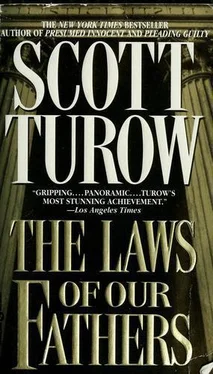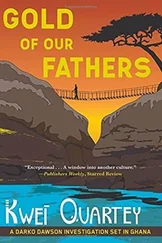Scott Turow - The Laws of our Fathers
Здесь есть возможность читать онлайн «Scott Turow - The Laws of our Fathers» весь текст электронной книги совершенно бесплатно (целиком полную версию без сокращений). В некоторых случаях можно слушать аудио, скачать через торрент в формате fb2 и присутствует краткое содержание. Жанр: Криминальный детектив, на английском языке. Описание произведения, (предисловие) а так же отзывы посетителей доступны на портале библиотеки ЛибКат.
- Название:The Laws of our Fathers
- Автор:
- Жанр:
- Год:неизвестен
- ISBN:нет данных
- Рейтинг книги:5 / 5. Голосов: 1
-
Избранное:Добавить в избранное
- Отзывы:
-
Ваша оценка:
- 100
- 1
- 2
- 3
- 4
- 5
The Laws of our Fathers: краткое содержание, описание и аннотация
Предлагаем к чтению аннотацию, описание, краткое содержание или предисловие (зависит от того, что написал сам автор книги «The Laws of our Fathers»). Если вы не нашли необходимую информацию о книге — напишите в комментариях, мы постараемся отыскать её.
The Laws of our Fathers — читать онлайн бесплатно полную книгу (весь текст) целиком
Ниже представлен текст книги, разбитый по страницам. Система сохранения места последней прочитанной страницы, позволяет с удобством читать онлайн бесплатно книгу «The Laws of our Fathers», без необходимости каждый раз заново искать на чём Вы остановились. Поставьте закладку, и сможете в любой момент перейти на страницу, на которой закончили чтение.
Интервал:
Закладка:
'Let's talk about tomorrow, Marietta. What have you been doing with the call?'
She checks the computer screen. If we start early, at 9 a.m., we'll get a couple of hours of testimony before I have to go on to the mid-week status call. Although I hear bail motions and other emergencies each day, routine matters – sentencings, progress calls, arraignments, guilty pleas – are scheduled on Tuesdays, in the morning or afternoons, so that trials can proceed on other days without constant interruptions.
'I think Molto's got a custody comin’ over,' she adds. 'That little girl – one who was supposed to put the drugs or something.'
'Tommy made a good opening,' I tell her. Marietta makes a face. 'Tommy's not your style?'
'He's one of those trippin-over-his-own-feet-type guys. Like this morning. What good did all that do him?' The leak to the Trib, she means, not just a low stunt, but a stupid one, since I was so unlikely to let him get away with it. Clearly, Marietta does not believe for a second Tommy was not Dubinsky' s source.' Besides,' she adds, then thinks better of whatever she was going to say. Marietta, who intervenes cheerfully in my personal life without invitation, is too much of a pro to express herself on pending cases. I invite her to go on, but even at that, she seems to take a moment to choose her words.
'Judge, he's sayin the boy was tryin to kill his father. Wasn't it the father, Judge, who posted Nile's bail? Wasn't that in the court file? We had a long bail report and then there wasn't any motion filed, cause the father put up his house. Remember?' I hadn't until now. 'What kind of sense does that make, Judge?' asks Marietta. 'Have his son try to kill him, then pay to get him out? Most folks think awhile 'fore they do that. That boy killed his momma and the father had him on bail in twenty-four hours. Why'd he be doing that?'
Because he doesn't think Nile's guilty. That's the logical answer, I suppose, but I keep that to myself and respond, more circumspectly, that perhaps we'll hear about this from the defense.
'What'd you make of Hobie, by the way?' I ask. 'Smooth, huh?'
'Oh, he's hot stuff, that one. Butter wouldn't melt in his mouth. Now, how'd this go, Judge? You know him, too?' 'Him, too.' I shake my head once in bleak wonder. 'Rich boy, idn't he?'
'Hobie? Richer than I was.' That's rich in America: someone who has more money than you. His father, if I recollect, owned a pharmacy.
‘I can tell,' says Marietta, ‘I can tell every damn time. Feet don't even touch the ground. He's marchin round that courtroom. "How you doin, girl?" Like he gave a good goddamn how I ever done. Just hopin nobody notice what kind of good time he's havin when he gets up in court, talkin like he's white.' She nods to cement that judgment. I think what I always think: God, they can be hard on each other. 'And you ain't seen him in years either, Judge?'
'No, you know how that is, Marietta. Once you give up the guy, you tend to lose his friends, too.'
A second passes. 'And why exactly was it you give the guy up, Judge? He do you bad? Must have been somethin like that if you haven't been talkin for twenty-five years.' Her eyes train on the glowing screen, but we both know we have arrived once more at Marietta's favorite subject. Wary of hurting her again, I toss my head vaguely. 'Wasn't the other way, was it?' she asks.
'No, Marietta. Not really.' Was it? For a second I am faint with fear, until the past again returns to focus. 'No, the main thing, Marietta, is that Seth more or less dropped out of sight. And I went into the Peace Corps. The last I heard from him, there was something about being kidnapped.'
'Kidnapped!' This declaration startles Annie, who has just entered the outer office. The keys on her broad black belt clink as she steals a few steps ahead, surveying the situation. 'Yeah, "kidnapped," ' says Marietta, and humpfs to herself. 'Judge, I hear better'n that every Friday night.'
‘It wasn't like that, Marietta. It's a crazy story. And I never knew much of it.' I look somewhat helplessly toward each of them, feeling suddenly vulnerable to the strange arc of my life. The two women, both dependent on my moods, watch me carefully. Time, I think. My God, time.
'We were young,' I say.
1969-70
Seth
When I was twenty-three and in the midst of crazy times, I arranged for my own kidnapping. I was not actually abducted. It was a ruse of kinds, but in the aftermath my life was sadly changed. One man was dead and I had taken another name. In the years since, I have always felt I had been stolen from myself.
It was 1970, still the height of 'the sixties,' that period when America was in the midst of war and tumult. The combat raged not only in Vietnam but here, at home, where young people like me who opposed US involvement were openly regarded as enemies of the government and our way of life. This role pleased me in many ways, but it gave my existence a persistent renegade air.
By April of 1970,1 had received my draft notice and was being forced to choose between conscription – and the likelihood of a tour of duty in the jungles of Vietnam – or exile in Canada.
Each course seemed unbearable. My opposition to the war was unyielding. On the other hand, I was an only child, weighed down by my parents' many claims on me. Even 1,900 miles away from them and my home in Kindle County, I felt them close – a hot breath from behind – a phenomenon that left me alternately infuriated or resigned. They were camp survivors who had met in Auschwitz after their families – her husband, his wife and child – had perished. My father was almost seventy now, still robust, still full of his subtle commanding powers, but bound for decline. Even more troubling was my mother, a fretful person who seemed to sustain herself by clutching me close. When I was a child, a sensation of my mother's pain was always turning near my heart, and I had grown up feeling an unwavering duty not to add further to her suffering. My departure with my girlfriend for California the prior fall had prostrated her with grief. Actual exile, as my father never tired of reminding me, would revive for her – for both of them – unbearable horrors.
Faced with the pressure of sorting this out, I allowed the other relations in my life to collapse. I fell out badly with my best friend since childhood, Hobie Turtle, who was a first-year law student in the Bay Area. But my greatest agony, as is usually the case, came from love. The spring before, in 1969, I had fallen helplessly for a young woman – strong, dark, and beautiful – named Sonia Klonsky, whom I had met on an overnight bus trip from Kindle County to D C, heading for one of the first of the Student Mobilization Committee's marches on Washington. At the time, we were both college seniors on the verge of graduation, she from the U. in the city and I from stuffy, renowned Easton College. With her striking dark looks, set amid a stormy abundance of jet hair, her long-waisted, full-busted proportions, and, most important, her air of frank seriousness about herself, Sonny was dazzling to me.
I had never been in love. In fact, I had never been a notable success with women. My bleak outlook and sardonic manner made me somewhat fashionable, I guess, but under the strain of sustained female attention, I tended to come off as simply weird.
My relationships all petered out after a few weeks. So my passion for Sonny was a great shock – the heat of it, the puppyish desire to be near, the amazing news that human loneliness, which I took as an elemental condition, could vanish like the reagents in a test tube. My mind and heart spun crazily on the magic of details: We were both left-handed. We both knew the words to every cut on Happy Jack. When we were alone, she called me 'Baby.' The news that I held a spot in the life of someone so fiercely intelligent, so beautiful, so surely destined to make her mark upon the world, clapped home three times a day with the breathtaking impact of divine revelation.
Читать дальшеИнтервал:
Закладка:
Похожие книги на «The Laws of our Fathers»
Представляем Вашему вниманию похожие книги на «The Laws of our Fathers» списком для выбора. Мы отобрали схожую по названию и смыслу литературу в надежде предоставить читателям больше вариантов отыскать новые, интересные, ещё непрочитанные произведения.
Обсуждение, отзывы о книге «The Laws of our Fathers» и просто собственные мнения читателей. Оставьте ваши комментарии, напишите, что Вы думаете о произведении, его смысле или главных героях. Укажите что конкретно понравилось, а что нет, и почему Вы так считаете.












